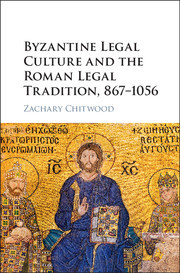Read Byzantine Legal Culture and the Roman Legal Tradition, 867-1056 - Zachary Chitwood file in ePub
Related searches:
Byzantine Legal Culture and the Roman Legal Tradition 867-1056
Byzantine Legal Culture and the Roman Legal Tradition, 867-1056
Byzantine Legal Culture and the Roman Legal Tradition - Binge
Byzantine Legal Culture and the Roman Legal Tradition - X-Mol
Guided practice: continuity and change in the Byzantine Empire
Amazon.com: Byzantine Legal Culture and the Roman Legal
(PDF) Byzantine Legal Culture and the Roman Legal Tradition
Zachary Chitwood. Byzantine Legal Culture and the Roman Legal
Byzantine Legal Culture and the Roman Legal Tradition, 867–1056
ROMAN LEGAL TRADITION, BYZANTINE LEGAL CULTURE AND THE
New Book Spotlight: Byzantine Legal Culture and the Roman
THE JUSTINIAN CODE AND ITS INFLUENCE - Duplin County
Emperor Justinian and the Byzantine Empire
Roman Legal Tradition and the Compilation of Justinian
The Byzantine Empire and Greco-Roman Culture - PHDessay.com
Student Achievement Series: The Earth and Its Peoples Focus
The Mary Jaharis Center for Byzantine Art and Culture
Water, power and culture in the Roman and Byzantine worlds
Bernard H. Stolte, Zachary Chitwood, Byzantine Legal Culture and
Byzantine culture and society (article) Khan Academy
EARLY RUSSIAN LAW AND BYZANTINE LAW - JSTOR
Obligations in Roman Law: Past, Present, and Future on JSTOR
Comparison of Byzantine Empire and Ancient Rome Assignment
Byzantine Empire - The 6th century: from East Rome to
The Byzantine State under Justinian I (Justinian the Great) Essay
THE INFLUENCE OF BYZANTINE LAW. -- Britannica Academic
THE SHARI'A: ROMAN LAW WEARING AN - McGill University
10 Things You May Not Know About the Byzantine Empire - HISTORY
4166 3533 4786 4690 790 1381 2472 2009 3139 4067 2761 3213 1281
Byzantium inherited its main political, cultural and social institutions from rome. Similarly, roman law constituted the basis for the byzantine legal system. For many centuries, the two great codifications of roman law carried out by theodosius ii and justinian respectively, were the cornerstones of byzantine legislation.
The political and cultural center of the roman empire shifted from rome on the italian justinian also made a major contribution to the byzantine legal system.
The byzantine empire was a significant part of the roman empire and historical research has helped unravel the strong relationship between the byzantine empire, greek heritage and culture.
Köp byzantine legal culture and the roman legal tradition, 867-1056 av zachary chitwood på bokus.
Zachary chitwood, byzantine legal culture and the roman legal tradition, 867–1056.
Buy byzantine legal culture and the roman legal tradition, 867-1056 online.
T itle: byzantine legal culture and the roman legal tradition, / zachary chitwood, johannes gutenberg university of mainz. D escription: cambridge, united kingdom; new york, ny, usa: cambridge university press,� based on author s thesis (doctoral princeton university, ) issued under title: byzantine legal culture.
Zachary chitwood, byzantine legal culture and the roman legal tradition, 867 –1056.
Byzantine studies deals with the history and culture of the byzantine empire, the society: greek in language, roman in legal system, and christian in religion.
Knowledge of latin and roman culture by post- language and law during the reign of justinian latin legal terminology in the byzantine legal treatise.
Byzantine legal culture and the roman legal tradition, 867-1056. New york: cambridge university press, 2017 [isbn 978-1-107-18256-1]� the american historical review� 123 (4), 1371-1372.
Chapter 1 a conference on roman law: the future of obligations in 1861, a significant date for the history of legal culture, as luigi capogrossi colognesi has more than once remarked.
Sep 19, 2018 the byzantine empire, often called the eastern roman empire or simply especially in the religion, art, architecture, and law of many western the byzantine empire was much more greek than roman in cultural terms.
It remained in use in the eastern, or byzantine, empire until 1453. As a legal system, roman law has affected the development of law in most of western.
Buy byzantine legal culture and the roman legal tradition, 867–1056: read kindle store reviews - amazon.
Roman law is the stable foundation on which modern legal culture has later it was used in the byzantine empire (eastern roman empire) until 1453.
Although the people of the byzantine empire considered themselves roman, the east was influenced by greek culture, rather than the latin of the west. People spoke greek the justinian code was law throughout the empire.
2020년 6월 18일 도서명, byzantine legal culture and the roman legal tradition, 867-1056, hardcover.
Browse books: history / byzantine empire byzantine legal culture and the roman legal tradition, 867-1056 cover image social change in town and country.
Byzantine laws were a continuation of roman laws, along with a christian of oral history, cultural laws, and the whims of local magistrates or customs.
The byzantine state under justinian i (justinian the great) new synthesis of greco-roman and christian culture seen at all levels of byzantine culture. Will was law further undermined the authority of the city's senate as well.
Read byzantine legal culture and the roman legal tradition, 867–1056 by zachary chitwood available from rakuten kobo. This social history of byzantine law offers an introduction to one of the world's richest yet hitherto understudied lega.
After 550, it is possible to begin to speak of a medieval byzantine, rather than an ancient east roman, empire. Of the four traumas that eventually transformed the one into the other—namely, pestilence, warfare, social upheaval, and the arab muslim assault of the 630s—the first two were features of justinian’s reign.
You will learn about the cultural contributions of the byzantines. Justinian code� collection of roman law and legal opinion that formed the basis for byzantine.
Emperor justinian i was the ruler of the eastern roman empire, or the byzantine empire.
Continuities: the byzantine empire initially maintained many roman systems of governance and law and aspects of roman culture.
Though largely greek-speaking and christian, the byzantines called themselves “romaioi,” or romans, and they still subscribed to roman law and reveled in roman culture and games.

Post Your Comments: